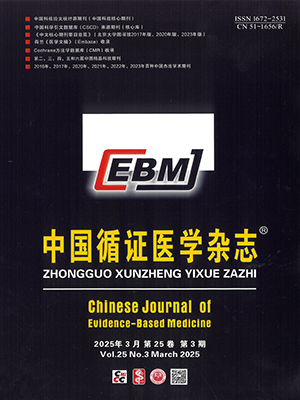| 1. |
Moisala M, Salmela V, Hietajärvi L, et al. Media multitasking is associated with distractibility and increased prefrontal activity in adolescents and young adults. Neuroimage, 2016, 134: 113-121.
|
| 2. |
Ophir E, Nass C, Wagner AD. Cognitive control in media multitaskers. Proc Natl Acad Sci USA, 2009, 106(37): 15583-15587.
|
| 3. |
Soldatova G, Chigarkova S, Dreneva A. Features of media multitasking in school-age children. Behav Sci (Basel), 2019, 9(12): 130.
|
| 4. |
Uncapher MR, K Thieu M, Wagner AD. Media multitasking and memory: differences in working memory and long-term memory. Psychon Bull Rev, 2016, 23(2): 483-490.
|
| 5. |
Ralph BC, Thomson DR, Seli P, et al. Media multitasking and behavioral measures of sustained attention. Atten Percept Psychophys, 2015, 77(2): 390-401.
|
| 6. |
曾宪涛, 刘慧, 陈曦, 等. Meta分析系列之四: 观察性研究的质量评价工具. 中国循证心血管医学杂志, 2012, 4(4): 297-299.
|
| 7. |
熊风, 赖玉清, 涂嘉欣, 等. 中国老年人群睡眠障碍流行特征的Meta分析. 中国循证医学杂志, 2019, 19(4): 398-403.
|
| 8. |
Faul F, Erdfelder E, Lang AG, et al. G*Power 3: a flexible statistical power analysis program for the social, behavioral, and biomedical sciences. Behav Res Methods, 2007, 39(2): 175-191.
|
| 9. |
Cain MS, Mitroff SR. Distractor filtering in media multitaskers. Perception, 2011, 40(10): 1183-1192.
|
| 10. |
Lee J, Lin L, Robertson T. The impact of media multitasking on learning. Learn Media Technol, 2012, 37(1): 94-104.
|
| 11. |
Minear M, Brasher F, McCurdy M, et al. Working memory, fluid intelligence, and impulsiveness in heavy media multitaskers. Psychon Bull Rev, 2013, 20(6): 1274-1281.
|
| 12. |
Lim Y. Media multitasking predicts unitary versus splitting visual focal attention. J Cogn Psychol, 2013, 25(7): 889-902.
|
| 13. |
Medeiros-Ward N, Watson JM, Strayer DL. On supertaskers and the neural basis of efficient multitasking. Psychon Bull Rev, 2015, 22(3): 876-883.
|
| 14. |
Cardoso-Leite P, Kludt R, Vignola G, et al. Technology consumption and cognitive control: Contrasting action video game experience with media multitasking. Atten Percept Psychophys, 2016, 78(1): 218-241.
|
| 15. |
Cain MS, Leonard JA, Gabrieli JD, et al. Media multitasking in adolescence. Psychon Bull Rev, 2016, 23(6): 1932-1941.
|
| 16. |
Gorman TE, Green CS. Short-term mindfulness intervention reduces the negative attentional effects associated with heavy media multitasking. Sci Rep, 2016, 6: 24542.
|
| 17. |
Wiradhany W, Nieuwenstein MR. Cognitive control in media multitaskers: two replication studies and a meta-analysis. Atten Percept Psychophys, 2017, 79(8): 2620-2641.
|
| 18. |
Pollard MA, Courage ML. Working memory capacity predicts effective multitasking. Comput Human Behav, 2017, 76: 450-462.
|
| 19. |
Martín-Perpiñá MM, Viñas Poch F, Malo Cerrato S. Media multitasking impact in homework, executive function and academic performance in Spanish adolescents. Psicothema, 2019, 31(1): 81-87.
|
| 20. |
İmren M, Tekman HG. The relationship between media multitasking, working memory and sustained attention. Social Sci Rev Faculty, 2019, 20(37): 1075-1100.
|
| 21. |
Müller SM, Schiebener J, Brand M, et al. Decision-making, cognitive functions, impulsivity, and media multitasking expectancies in high versus low media multitaskers. Cogn Process, 2021, 22(4): 593-607.
|
| 22. |
Spence A, Beasley K, Gravenkemper H, et al. Social media use while listening to new material negatively affects short-term memory in college students. Physiol Behav, 2020, 227: 113172.
|
| 23. |
Twenge JM, Martin GN, Campbell WK. Decreases in psychological well-being among American adolescents after 2012 and links to screen time during the rise of smartphone technology. Emotion, 2018, 18(6): 765-780.
|
| 24. |
Ralph BC, Smilek D. Individual differences in media multitasking and performance on the n-back. Atten Percept Psychophys, 2017, 79(2): 582-592.
|
| 25. |
Edwards KS, Shin M. Media multitasking and implicit learning. Atten Percept Psychophys, 2017, 79(5): 1535-1549.
|
| 26. |
Sanbonmatsu DM, Strayer DL, Medeiros-Ward N, et al. Who multi-tasks and why. Multi-tasking ability, perceived multi-tasking ability, impulsivity, and sensation seeking. PLoS One, 2013, 8(1): e54402.
|
| 27. |
Alzahabi R, Becker MW. The association between media multitasking, task-switching, and dual-task performance. J Exp Psychol Hum Percept Perform, 2013, 39(5): 1485-1495.
|
| 28. |
Kobayashi K, Oishi N, Yoshimura S, et al. Relationship between media multitasking and functional connectivity in the dorsal attention network. Sci Rep, 2020, 10(1): 17992.
|
| 29. |
Ralph BC, Thomson DR, Cheyne JA, et al. Media multitasking and failures of attention in everyday life. Psychol Res, 2014, 78(5): 661-669.
|
| 30. |
Baumgartner SE, Weeda WD, Heijden LLVD, et al. The relationship between media multitasking and executive function in early adolescents. J Early Adolesc, 2014, 34(8): 1120-1144.
|




